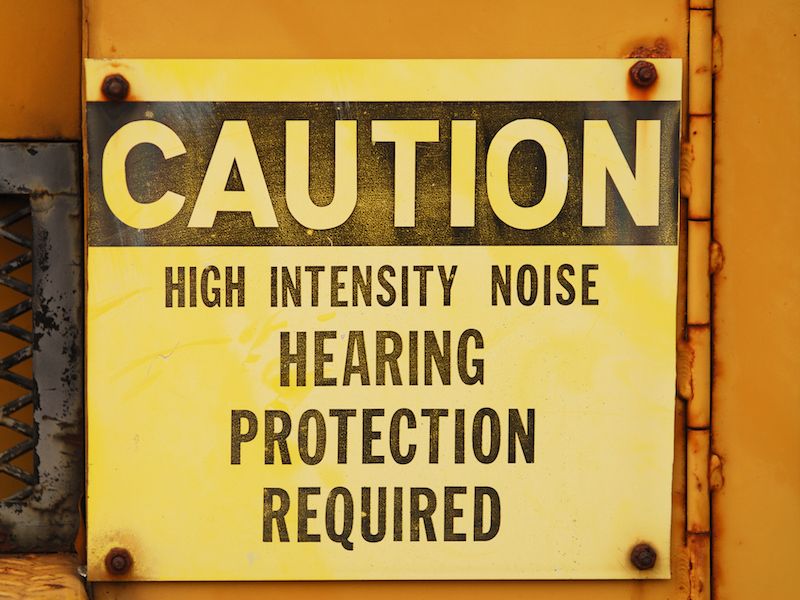
Knowing you should protect your hearing is one thing. Recognizing when to protect your ears is a different story. It’s not as easy as, for example, determining when to wear sunblock. (Are you going to go outdoors? Is there sunlight? You should be wearing sunscreen.) It isn’t even as simple as determining when to use eye protection (Handling hazardous chemicals? Doing some construction? You need eye protection).
It can feel like there’s a large grey area when dealing with when to use ear protection, and that can be detrimental. Often, we’ll defer to our normal tendency to avoid hearing protection unless we have information that a particular place or activity is dangerous.
Risk Evaluations
In general, we’re not very good at assessing risk, especially when it comes to something as intangible as injury to the ears or the risk of long term sensorineural hearing loss. To demonstrate the situation, check out some examples:
- Person A attends a very loud rock concert. The concert lasts approximately 3 hours.
- A landscaping company is run by person B. She spends a significant amount of time mowing lawns, then goes home to a quiet house and reads.
- Person C is an office worker.
You might think that person A (let’s call her Ann, to be a little less clinical) might be in more hearing danger. Ann leaves the show with ringing ears, and she’ll spend the majority of the next day, struggling to hear herself talk. Presuming Ann’s activity was hazardous to her ears would be reasonable.
The noise that person B (let’s just call her Betty), is exposed to is not as loud. Her ears don’t ring. So it has to be less hazardous for her ears, right? Not necessarily. Because Betty is mowing every day. Actually, the damage builds up a little bit at a time although they don’t ring out. If experienced on a regular basis, even moderately loud sounds can have a damaging affect on your hearing.
Person C (let’s call her Chris) is even less obvious. Lawnmowers come with instructions that emphasize the dangers of ongoing exposure to noise. But although Chris has a relatively quiet job, her long morning commute through the city every day is rather loud. What’s more, she sits behind her desk and listens to music through earbuds. Is protection something she should think about?
When You Should be Concerned About Protecting Your Ears
The normal guideline is that if you need to raise your voice in order to be heard, your environment is noisy enough to do injure to your ears. And you really should think about wearing earplugs or earmuffs if your surroundings are that loud.
So to put this a little more clinically, you need to use 85dB as your limit. Sounds above 85dB have the capacity to result in injury over time, so you need to consider wearing hearing protection in those situations.
Your ears don’t have their own sound level meter to notify you when you reach that 85dB level, so countless hearing specialists suggest downloading specialized apps for your phone. You will be able to take the appropriate steps to protect your ears because these apps will inform you when the noise is getting to a dangerous volume.
A Few Examples
Your phone might not be with you wherever you go even if you do download the app. So we might establish a good baseline with a couple of examples of when to safeguard our ears. Here we go:
- Driving & Commuting: Do you drive for Lyft or Uber? Or perhaps you’re just hanging around downtown for work or boarding the train. The noise of living in a city is bad enough for your hearing, not to mention the extra injury caused by cranking up your tunes to drown out the city noise.
- Domestic Chores: Even mowing the lawn, as previously stated, necessitates hearing protection. Cutting the grass is a great example of the type of household task that might cause damage to your ears but that you probably don’t think about all that often.
- Listening to music with earbuds. OK, this doesn’t call for protection but does require care. Give consideration to how loud the music is, how long you’re listening to it, and whether it’s playing directly into your ears. Consider getting headphones that cancel out outside sound so you don’t have to crank up the volume to hazardous levels.
- Using Power Tools: You understand you will want hearing protection if you work all day in a factory. But how about the enthusiast building in his garage? Most hearing professionals will recommend you wear hearing protection when operating power tools, even if it’s just on a hobbyist basis.
- Exercise: Your morning cycling class is a good example. Or perhaps your daily elliptical session. You might think about wearing hearing protection to each one. Those trainers who make use of sound systems and microphones (and loud music) to motivate you might be good for your heart rate, but all that loudness is bad for your ears.
These illustrations might give you a suitable baseline. When in doubt, though, you should choose protection. In the majority of cases, it’s better to over-protect your ears than to leave them subject to possible injury in the future. If you want to be able to hear tomorrow, protect today.